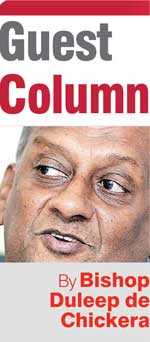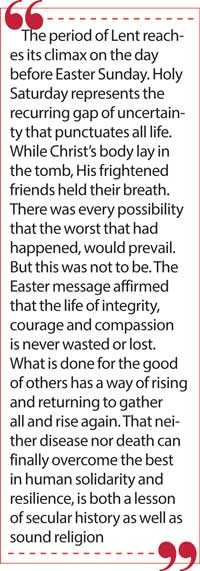Friday Feb 13, 2026
Friday Feb 13, 2026
Friday, 10 April 2020 00:00 - - {{hitsCtrl.values.hits}}
Last year at Easter, sudden acts of violence spread immense fear, injury and death, within a matter of moments. A small group of extremists was to become the face behind the horror. Some admirable  interventions to prevent communal disintegration, were overshadowed by a rise of racism, overnight. When it was most necessary to do so, we failed to hold the country together.
interventions to prevent communal disintegration, were overshadowed by a rise of racism, overnight. When it was most necessary to do so, we failed to hold the country together.
Human security
Prominent among this mix of sane and shocking reactions, was the demand for physical security. This trend influenced the Presidential election that followed soon afterwards. While extremist violence appears to have been contained since then, little else has happened for the common good. Other urgent challenges and needs, down-played around election time, are now surfacing to convey that important as it is, physical security mostly, is far from adequate to bring fulfilment to the people of a modern state.
As the gap between those who clamoured for a leadership of physical security, and those who did not, narrows, the common yearning for a better and more integrated quality of life increases. The frustrations encountered by a minority government, repeatedly replayed as the cause of this hiatus, is not convincing. A political will strong enough to get some things done which should not have been done; such as several arbitrary appointments to high office, or leave some things undone, that should not have been left undone; such as the unresolved layers of corruption and the continuing vulnerability of the daily wage earner, tells a different story.
A few days from now another Easter Sunday will return, to be followed by a General Election. But between now and then and thereafter, a threat to human security, far more elusive and feared than the threat of terrorism, that has the whole world groping for solutions, must dominate our attention and make demands on our collective wisdom, energy and resources.
COVID-19 cannot be blamed on any extremist group or used to malign specific communities. A mystery, carried and spread among humans without discrimination, it neither dislikes nor works against, favours nor works for, any particular group or movement. It targets any and all within its path and is perhaps the most challenging enemy that our generation has known.
Along with the global panic and shut-down that the virus is already spreading, it also exposes the stunted and populist understanding that human security simply amounts to physical security. This is a convenient perspective for governments who exploit it to maximise external aggression, internal suppression of dissent, or both.
Consequently this deadly virus opens our eyes to the fuller understanding of human security. In light of the threat to life, for instance, human security must also include protection and cure from disease and sickness that responsible governance is to ensure.
Economic security is yet another vital component of human security. As trade and businesses shut down or slow down and wages are compromised, those hit hardest, will require economic protection. Through all this, a major collapse of the national economy will have to be prevented with one eye on its future sustainability. In a word, this unprecedented humanitarian crisis we are called to face, is a strong reminder that human security cannot be reduced to the realm of physical security. The consequences of doing so can be most costly.
Review and reform
Lent prepares us for Easter, the festival that celebrates risen-ness in circumstances of hopelessness and death. And if Easter will mean anything this year, it calls us to stand together so that we could work through this disease-crisis together. We must not make the mistakes we made previously when crises ironically invited us to think and behave as one nation. When the tsunami struck we failed. We failed again after the war and after the Easter bombings.
What the country consequently needs just now is a national government. Such a move will endorse the seriousness and anticipated long term impact of the current virus-crisis and pool our best human resources, regardless of political affiliation. It will announce that this is not the time to play party politics.
Under a national government, politicians will be tasked to convene, finance and authorise, and then step back to allow those best qualified, medically and administratively, to lead us through this crisis. Such persons should learn from current global experiences, research and process, and offer to these exchanges as well.
Mistakes will yet be made and we may not travel as fast and best as possible. But if our wisest and most competent citizens are in the right place, and politicians recognise their limitations and stick to their role without interfering or trying to gain political mileage, we will come out of this. We will certainly be bruised and grieved, but we will also know that even when we failed, we tried and failed better.
The decision to postpone the coming General Election is prudent. It would have been impossible to address the more serious crisis that calls for collaboration of the highest integrity, with one eye on competitive and divisive party politics. With elections off our back for a while, we are now free to direct our human and national energy and resources towards the urgent health and economic security of our people.
Religion put to the test
The religions too have a role to play in this crisis. The temporary cancellation of religious gatherings is necessary. But since all religions propagate a higher quality of life, a shutting-down in some areas is to run parallel with a stepping-out, in others. The respective religions are to determine what they can offer best, but three immediate initiatives call for consideration.
As people grow anxious, even frightened, the need for counselling will increase. While the Health authorities must deal with information and guidance on the virus, trained and caring befrienders of all religions could be made available to hear, comfort and reassure people. Hot lines should be set up and publicity given.
Since the religious space is essentially a place of healing; community halls, preaching halls and other suitable buildings could be released for use by the State as information/awareness centres, testing centres, places of rest for overworked medical workers, and even quarantine centres.
Religious organisations could run (uncooked) food banks, for those, unable to stock supplies due to the lack of finances, likely to suffer wage loss, or the house bound. Health precautions will have to be strictly adhered to by those who serve and those served.
If some of this work can be done in collaboration between the religions, it will mitigate chances of animosity that the anniversary of the Easter bombings could provoke, to become one of our finest moments.
No doubt this work will require healthy volunteers. And if anything were to challenge the religious to volunteer, the example of thousands of women and men from the medical, military, cleaning sectors and all other essential services, taking risks out there on our behalf, does so. In secular terms, they practice the meritorious deed or servant ministry, and press the religions to do likewise.
Creative withdrawal
The best collective contribution that citizens can make to manage the crisis is to practice social distancing. While the early days will be difficult and even inhibitive, the time spent alone and with loved ones can be made surprisingly creative.
If we use this time to read and engage in introspection, pray and meditate, learn something new like a language or a skill, or stop to listen to nature, music and children, eat and exercise sensibly and review and strengthen relationships; the nation that comes out of this crisis will be better equipped to heal the mess that we have made of our lives and our world.
Uncertainty and after
The period of Lent reaches its climax on the day before Easter Sunday. Holy Saturday represents the recurring gap of uncertainty that punctuates all life. While Christ’s body lay in the tomb, His frightened friends held their breath. There was every possibility that the worst that had happened, would prevail.
But this was not to be. The Easter message affirmed that the life of integrity, courage and compassion is never wasted or lost. What is done for the good of others has a way of rising and returning to gather all and rise again. That neither disease nor death can finally overcome the best in human solidarity and resilience, is both a lesson of secular history as well as sound religion.
With peace and blessings to all.